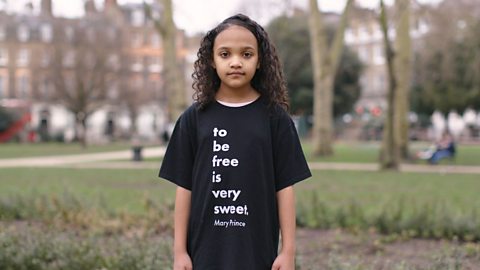ABDIRAHMAN:Hi, my name is Abdirahman. I'm 14 years old and I live in Sheffield. My family comes from Somalia, which is a country in East Africa. But did you know that the United Kingdom is home to one of the largest Somali communities in Europe? Somalis have lived in the UK for nearly 200 years, but more recently, lots of families moved here during the 1990s because of a civil war, which is when people from the same country fight each other for power. To learn more about Somalia's civil war and what it's like to leave your home and move to the UK, I'm meeting Magid. He's a big role model to all the young Somalis in the area.
MAGID:So when I was five years old, my mother gathered me and my siblings and we left Somaliland. And the reason was, at the time there was a civil war that was taking place in Somalia. And I guess trying to understand why the civil war was taking place can be a bit tricky. But a long time ago, many European countries used violence and intimidation to control and conquer indigenous people and turn their countries into colonies, basically.
ABDIRAHMAN:What's a colony?
MAGID:A colony is a country that is controlled by a more powerful country, mainly from a very long way away. And the powerful country mainly exploits the colony and kind of really forces its own language and cultural values on that people, basically. Different countries have got different views and ideas in terms of how they should run a colony. So when Britain, France and Italy decided to end colonial rule at the end of World War Two, there was a lot of confusion. The three separate parts of Somalia really found it difficult to unite. And in 1991, the president of Somalia, Siad Barre, got overthrown, creating a lot of chaos and violence in the area which made it difficult for people to live in. When we left Somalia, we came to Ethiopia, which is a neighbouring country next to Somalia, where we spent six months before we came to the UK as refugees.
ABDIRAHMAN:What's a refugee?
MAGID:A refugee is someone who is forced to leave their home, their country, just because it's dangerous. When we came to the UK, we settled in Sheffield and like many people that move to a new country, we had a lot of difficulties. The language was really hard to pick up and just adjusting to a whole new way of life we found really difficult. And my mother, bless her, she was working as a cleaner to support the family and she actually still lives in the same neighbourhood that we grew up in. And today, I'm a politician, writer and activist.
ABDIRAHMAN:What's an activist?
MAGID:An activist as someone who tries to bring about positive change, whether that be in their school, their community or society as a whole. And I'm someone who's really proud of my African roots, as well as being a very proud British northerner. In 2018, I became the youngest ever Lord Mayor of Sheffield. And as you can imagine, as someone who is a black Muslim refugee it was a big change from what they were used to. Though I am originally not from Sheffield, I am of it. It has made me who I am. From the hilltops to the rivers, from the trees to the tramlines, from The Blades to The Owls, in the rain, the snow and the sunshine, Sheffield is and will always be my home. Doing things differently can be scary. There are people who will hate you for it. But I promise you there are people who will love you for it, who will join you in it. And, even more importantly, you will risk changing the world in small ways and large ways, and middle ways in between. But if you keep doing things how they've always been done, and if you keep sticking to traditions, then you risk never knowing what it's like to succeed or to fail in the pursuit of something greater. It's important to inspire others, regardless of where in the world that you come from. So get involved in your community and make positive change.
ABDIRAHMAN:Magid's story is important because it teaches us that history is alive and everything that we do can add to it. It is especially inspiring to see someone who went through the things that Magid did and go on to give so much to his community. He makes me proud of my Somali heritage. And the thing that will stay with me the most is that no matter where we come from, we can find community and home wherever we end up.
Video summary
In this short film 14-year-old Abdirahman meets Magid Magid, a Somali-British activist and politician who served as the youngest ever Lord Mayor of Sheffield from May 2018 - May 2019.
Abdirahman is also from Somaliland, East Africa, and questions Magid about what life was like coming to England as a refugee in the middle of the Somalia civil war.
The film touches on sensitive topics, such as what a civil war is, why it might start, and what it's like moving to an unknown country as a child.
The film goes on to explain how people can find community wherever they go, and Magid speaks passionately about standing up and making a positive change in a community.
The film ends with Abdirahman reflecting on how history is alive and everything we do can add it to.
This short film is from the ≥…»ÀøÏ ÷ Teach series, Black British Stories.
Teacher Notes
Before watching the film
You may want to discuss civil wars and how, after the end of World War Two, Britain, France and Italy decided to end colonial rule over Somaliland. Somalia found it difficult to unite the previously three separate colonies and, in 1991, Mohamed Siad Barre, the Somalian president, was ousted and a civil war began which has lasted for decades. Many people all over the world have escaped from the violence and chaos of civil wars and end up as refugees. Please note, conversations around civil war may lead to other discussions and questions from pupils about land, ownership and rule. This may be prompted by the film itself – for example, empire and colonisation – or from what pupils have seen in the news (for example, Brexit). Depending on your local community and pupils’ lived experiences, this might also include discussions and questions on gangs, territory and postcode violence.
Somalia is a formally recognised state, but since the civil war political groups in the northern area of Somalia – former British Somaliland – have declared the region independent and known as the Republic of Somaliland. Magid himself refers to Somaliland in the film and pupils who have family ties to Somalia may refer to it too.
Please note, this short film shows images of refugee camps and civil war in Somalia which may be upsetting for some pupils. As a counterbalance to this negative portrayal of life in Africa, and the negative stereotypes this reinforces, you may wish to plan lessons exploring other aspects of culture across African countries, such as architecture, food and lifestyles.
Support should be available for pupils after watching and if pupils in your class have lived experience of war, they/their families should be made aware of the content of the lesson in advance. Discussions on immigration should be treated with sensitivity, particularly if there are pupils in your class who are refugees or asylum seekers.
Questions to consider
Depending on the focus of your lesson, you may wish to pause this short film at certain points to check for understanding, asking questions such as:
- What do you think it felt like living as a young child in an area where a civil war is taking place?
- What do you think it felt like for Magid coming to England as a refugee?
- What do you think it felt like not being able to speak the same language as everyone else?
- What do you think was different about living in Somalia and England?
- What do you think it felt like being the youngest ever Lord Mayor of Sheffield?
- Why do you think it is important to try and make a positive change in your community?
- How do you think you could get involved in your community?
- What positive change could you make for the world?
Activities to further explore learning
Life as a refugeeExplore further what life as a refugee may have been like for Magid coming to England when he was five and escaping civil war. You may want to read Refugee Boy by Benjamin Zephaniah for another perspective on this subject. Pupils could then write a poem in role, based on who they are and how they feel in this new land. Please note, this activity should be approached with sensitivity with your cohort. Pupils may have had experience of being refugees.
Making a differenceExplore with pupils about what an ‘activist’ is and how they could each strive to make a positive change in their school, community or society as a whole. Challenge pupils to think of a positive change they would like to make and ask them to write a letter to the person able to make that change (e.g. head teacher, local councillor or member of parliament.)
CommunityPupils could explore their local community and what makes their community work. They could start with their school community and explore the different roles people have to make this community successful (e.g. parents, pupils, teachers, governors, etc.) They could then look further at their local wider community. Challenge pupils to think of how they could get involved as a group in their wider community.
School councilEncourage pupils to look at their school council (or, if there is not one, whether one can be formed). Pupils can consider how effective their school council is and whether there could be any changes to make a positive difference to how this council operates. Ask a school council rep to share their experiences and work achieved throughout their elected period.
Key Vocabulary
- Activist - Someone who does something to make a change, or stop a change in society.
- Colony - An area of land that is occupied and in control by settlers from another country.
- Community - A group of people living in a particular area.
- Civil war - A war between organised groups from the same country.
- Culture - A pattern of behaviour shared by a society, or group of people.
- Discrimination - The unjust or prejudicial treatment of different categories of people.
- Diversity - Differences in racial and ethnic, socioeconomic, geographic, and academic backgrounds.
- Empire - Lands or regions that are controlled by one ruler or government, usually operating from overseas.
- Equality - When people are treated the same, regardless of what they look like or where they come from.
- Lord mayor - A ceremonial representative with no formal power, traditionally chosen by fellow members of a town, borough or city council.
- Mayor – A leader directly elected by the people.
- Prejudice - A preconceived opinion that is not based on reason or actual experience.
- Racism - The belief that people of different races or ethnic groups have different value in society, and using this against them.
- Refugee - A person who is seeking a safety after being forced to flee violence, persecution or war. An asylum seeker is somebody who has arrived in a country and asked for asylum. Seeking asylum in the UK is a legal process and part of the pathway in receiving refugee status.
This short film is suitable for teaching KS2 / 2nd level pupils and links to various areas of the curriculum including to history (black history) and personal, social and relationships education (diversity and community). The focus on the power of the written word, specifically autobiographies and poetry, also provides a link with the English curriculum.
Cultural heritageThis short film raises questions about what makes up your cultural heritage and how this connects a community.
Inspiring changeThis short film raise questions about what inspires change today. Links can be made to movements that are current (Black Lives Matter, Extinction Rebellion, etc.), and how these movements have been inspired and developed.
Mac Williams - Working in the coal mining industry. video
In this short film Abiodun MacDonald Williams, known to his close friends as Mac, talks to his neighbour, 11-year-old Iris, about what it was like working as a ventilation officer in County Durham in the 1960s.
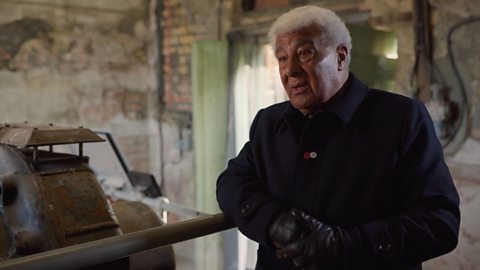
Alison Bennison - Working as a NHS nurse. video
This short film for primary schools follows Alison Bennison's journey to Britain from Barbados in 1960, to train as a nurse and work for the National Health Service. The story is told by Alison's granddaughter, Lindsey, and nine-year-old Dontay.
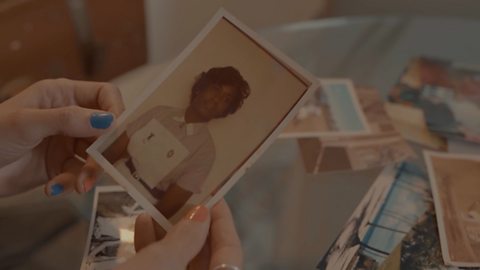
Christina Shingler - Becoming an author of children's literature. video
In this short film Felix, aged 10, talks to his grandmother Christina (Tina) Shingler, a writer who decided to do something about the lack of black characters in British literature.
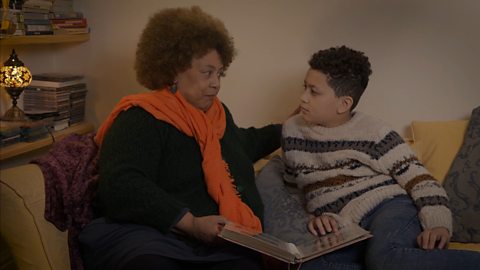
David Mwanaka - Becoming a farmer in Britain. video
In this short film 11-year-old Anashe meets David Mwanaka, and finds out about his journey from Zimbabwe to becoming a farmer in Britain.
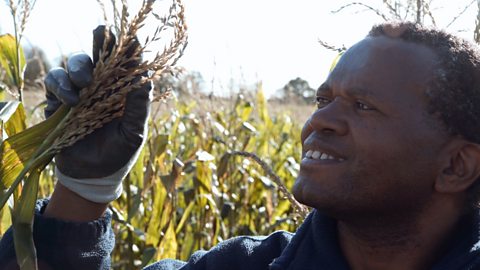
Dennis Morris - Becoming a photographer. video
This short film tells the story of Dennis Morris, a well-known photographer from London, originally from Jamaica, who photographed famous musicians including Bob Marley.
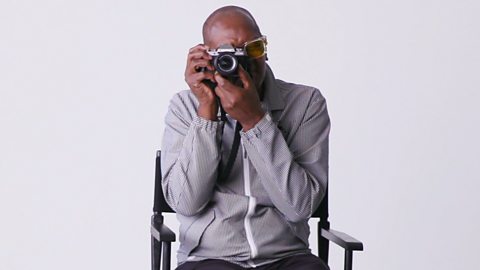
Elsie Owusu - Becoming an architect in Britain. video
In this short film 11-year-old Kendra meets Elsie Owusu, who moved from Ghana to the UK as a child and became an architect, and dealt with the challenges of working in a white, male-dominated profession.
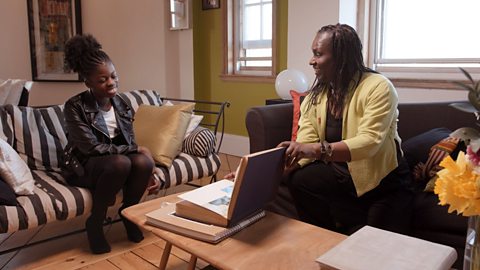
Eunice Olumide - Breaking into the fashion business. video
In this short film 12-year-old Lore meets Eunice Olumide, a second generation Nigerian who was born and grew up in Scotland and become a professional model.

Vernon Samuels - The Bristol Bus Boycott of 1963. video
In this short film 13-year-old Amelia and Vernon Samuels, who represented Great Britain in the 1988 Olympics, tell the story of the Bristol Bus Boycott and Vernon's father, who was the first black bus driver in Bristol.
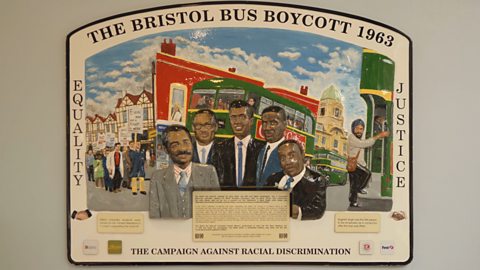
Yesha Townsend - A Bermudian poet in London. video
This short film tells the story of Yesha Townsend, a Bermudian poet who currently lives and works in London, and how she has been influenced by Mary Prince, a black woman who escaped from slavery.
